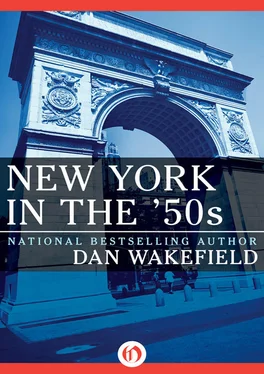We were both young and crazy for literature and experience, and to us Carey McWilliams, with his space shoes, buttoned-up cardigan, and thinning black hair slicked straight back from his pale forehead, seemed like the ultimate square. The image was reinforced by what we regarded as his sober, right-thinking, well-meaning, unexciting editorials. McWilliams seemed like the safe, predictable liberal, the person who believed in all the correct causes but without any passion or fire.
At least Norman—or Di G, as he was known—could charm Carey, as he could almost anyone, with his wild-man Italian enthusiasm, which he played with great élan. Carey and I simply never hit it off; we worked together and maintained a polite manner toward each other, but really felt no rapport.
After a pleasant but somewhat strained talk with McWilliams when I returned from Mississippi, I was taken in to meet the new publisher of The Nation , a ruggedly handsome, intellectually rough-around-the-edges man named George Kirstein. He looked as if he might have stepped out of an Esquire ad, with his sharp suit and tie, brilliantly shined shoes, well-coifed hair, and strong tanned face, weathered from the sailing he did on his yacht. George was direct, irreverent, sometimes impolite, and enjoyed a good laugh, a big drink, and a hearty meal.
In the hushed, serious atmosphere of the magazine, which had the dank aura of one of those cobwebby storerooms lived in by spinster sisters preserving the ancient family archives (the remains of the 1930s radical left wing), Kirstein seemed as colorful and refreshing as the playboy of the Western world. He was a wealthy man whose Boston family had made a fortune (Filene’s department store was among their businesses) and given generously to good works and culture. George was a Harvard graduate who served on the National Labor Relations Board during World War II, and who injected a needed transfusion of money into the ailing Nation when he became publisher, the year I wrote my first article.
Kirstein suffered what seemed to me an unnecessary intellectual inferiority complex because of his two artistically prodigal siblings, the New York City Ballet director Lincoln Kirstein and the literary biographer Minna Curtiss, who had written a book on Proust. George’s public image was that of the crass businessman among the artistes , which I think he cultivated in self-defense, yet I found his the most original mind at The Nation . McWilliams had the reputation of the brilliant liberal editor, yet to me his ideas often seemed recycled or geared to special causes of the magazine designed to spur bulk sales to a particular union or pressure group. It was George who wanted to try something new all the time—including me, which of course was one of the reasons I liked him.
“We could use a young guy like you,” he said when I met him. His office was in the one bright room at the end of the floor, with windows that offered a view of the surrounding commercial and apartment buildings of the Village. He tamped his pipe and said he’d like me to do some more on-the-scene reporting, to provide something current among the long-range think pieces on politics, economics, public policy, and the arts that were the principal fare of the magazine.
Not surprisingly, this struck me as a wise and perceptive policy. A year or so later, when I had an offer to write for another publication, Kirstein proposed a weekly retainer of $75 in return for my writing two articles a month for The Nation . In the meantime, I was happy to free-lance for them at their going rate of $40 per article.
More than any other writer I knew, C. Wright Mills’s friend and neighbor Harvey Swados embodied the search to live and do his work in a commercial world and maintain his commitment as an artist. Though a little more than a decade older than me and my generation, he served as a model for many of us, wrestling with problems we were just confronting or foresaw down the line as part of the struggle to live and write. He wrote most of his first novel, Out Went the Candle , on the commuter train to New York from his home in Valley Cottage, in Rockland County, while he worked in the office of Israel Bonds, writing publicity. After that experience he decided that a writer shouldn’t have another job that drew on his ability to write, requiring him to use his craft for a lesser purpose than literature, which divided his mind—his very self—between art and commerce. That dilemma became a theme of his work and the subject of his novel False Coin .
Next he went in the opposite direction and got a laboring job, working on the assembly line at the Ford plant in Rockland County. Out of that experience he drew the material for an insightful book of connected stories, On the Line —yet the job left him so exhausted, he found it hard to write in what time was left, so he gave up that route too. After that, he took a part-time position teaching writing at Sarah Lawrence. His teacher’s salary, combined with grants, fellowships, journalistic assignments, and modest book advances, enabled him to support his wife and three children, in a home filled with books, talk, laughter, and music (Harvey played the piano and flute, his daughter Felice the harp) which I loved to visit.
Though I wasn’t even considering starting a family, Harvey and his wife and children were the kind I’d have wanted. They showed me that family life was not only possible for a writer but could even be fulfilling, stimulating, and fun, with great books, Bach cantatas, and even a goat, which they kept in their yard in Valley Cottage and got milk from.
Harvey had an active social conscience as well as a creative imagination, and he loved to do journalism on the model of George Orwell, going down into a coal mine to write about what conditions were like, talking to the men on the assembly line at the Ford plant to explode “the Myth of the Happy Worker.” He wrote essays and articles for magazines like The Nation and Dissent that paid little but adhered to his own principles—expressed in the title of his collection of some of those pieces, A Radical’s America —and allowed him to get his message across without compromise. Few were as dedicated, or as pure in sticking to principle, as Harvey.
We all took different routes for survival, trying to write and make a living at the same time. The year Bruce Jay Friedman began working as a magazine editor, he published his first short story in The New Yorker (“Wonderful Golden Rule Days”) and found time to write fiction after hours. He also helped many other young writers get their start or keep financially afloat by buying their stories for the men’s adventure magazines he was running. “When I was in charge of the four magazines,” Friedman says, “I needed thirty-six stories a month. I only had a staff of five or six, so I was dependent on an army of free-lancers. Someone recommended a guy called Mario Puzo, and I hired him on the basis of a novel he wrote, The Dark Arena . He thought my hiring him was the kindest thing anyone ever did, but I was just trying to make my own job easier by getting a good writer. He worked for me for five years while he was writing The Godfather . Mario probably wrote two billion words for me. I’d have an illustration done of some battle, and then enlarge it and show it to him. It would be some fictitious scene from World War II, because we’d run out of real battles and we couldn’t just keep storming Anzio month after month. He wrote these novels we called book bonuses, and I was so enthusiastic about his work I put my own job on the line and demanded that our publisher break our salary cap of $500 per book bonus and pay Mario the unheard-of sum of $650. Mario thought it was fabulous. We’ve been friends ever since, and he still thanks me for that raise to $650.”
Читать дальше












